French election explained in five charts
- Published
French voters are choosing a new president - amid considerable political uncertainty in Europe and the world following the British vote for Brexit and the election of Donald Trump as US leader.
There are five leading candidates - from across the political spectrum - who will contest the first round of voting on 23 April and unless one candidate wins more than 50% of the votes, the two leading contenders will then go through to a second round on 7 May.
So who are the candidates and what are the issues likely to decide this election?

The candidates
On the far right, the National Front's Marine Le Pen appears to have achieved more electoral success since distancing herself from some of her father's more extreme xenophobic policies.
Latest opinion polls show Ms Le Pen is ahead of the other four candidates in the first round - though a long way short of 50% - and is therefore likely to get through to the run-off.
In 2002, Jean-Marie Le Pen got through to the second round, but lost to Jacques Chirac.
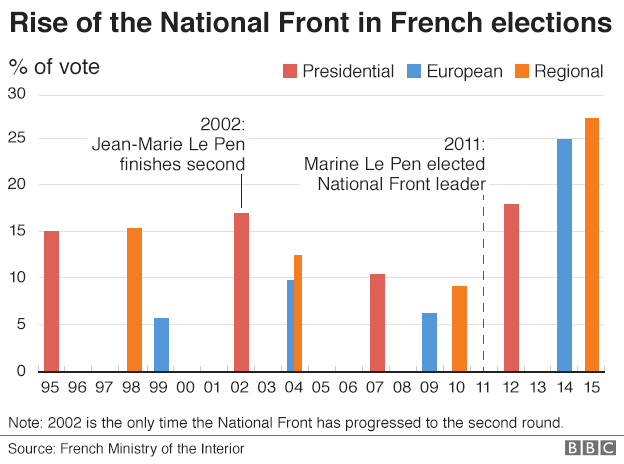
Opinion polls currently suggest Marine Le Pen would be defeated in the second round by Emmanuel Macron. Without the backing of a traditional political party, the former economy minister, who has never held an elected office, is standing as a centrist candidate.
The previous front-runner, centre-right Republican Francois Fillon, has lost support over allegations his wife and children were paid public money for jobs they never had.
Prosecutors have launched a full judicial inquiry into the affair but he has survived an attempt within his party to replace him as candidate.
Socialist and former education minister Benoit Hamon, with a reputation as a left-wing rebel, has a plan to introduce a universal income which would be rolled out initially to those on a modest income, being expanded to all French citizens some time after 2022.
Far-left candidate Jean-Luc Melenchon has the backing of the French Communist Party and stood unsuccessfully for the presidency in 2012.

Unemployment
One of the overriding issues facing French voters is unemployment - with at least one in four people aged under 25 unemployed.
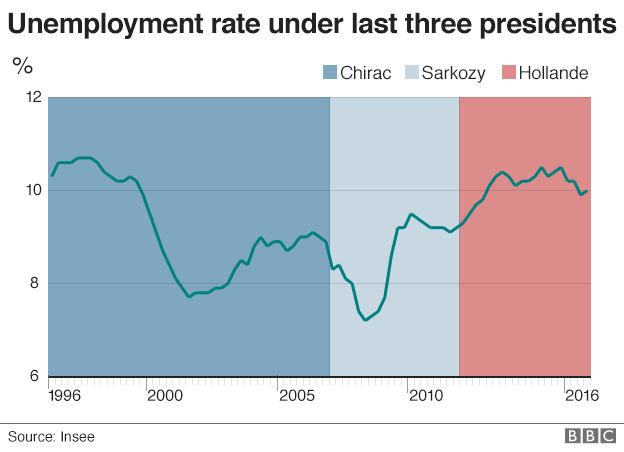
The national rate stood at 10% in the last quarter of 2016, external and according to the French official statistics office, Insee, it fell over the year by just 0.2%.
Latest unemployment figures for the European Union show France had the 8th highest jobless rate, external out of the 28 member states in December - and more than double that of Germany and the UK.
Last year's slight fall in the jobless rate came too late for President Francois Hollande, who had staked his reputation on creating more jobs during his time in office. Faced with very low ratings in the polls, he pulled out of the election race - the first French president not to run for a second term in modern history.
The problem of reducing unemployment will now fall to his successor.

Economy
The French economy is the second-biggest in the eurozone - but its recovery from the financial crisis of 2008 has been slow.
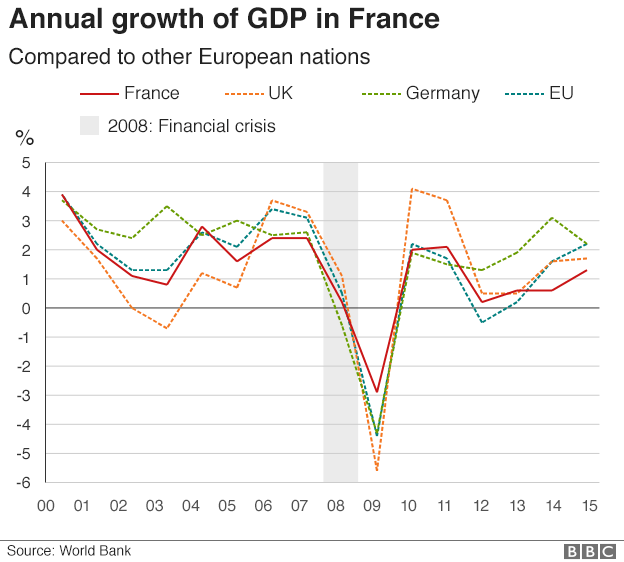
One of Mr Hollande's key policies was a new labour law, intended to help boost the economy by giving firms greater freedom to increase regular working hours, reduce pay and lay off workers.
But measures were watered down to get the bill through and the hoped-for improvements in the economy have not yet materialised.
France's economy, measured in terms of its Gross Domestic Product, has continued to lag behind its closest European neighbours, Germany and Britain.
All the leading candidates have argued that deep changes are needed in the French economy.

Security
Security and immigration are also high on the agenda in this election.
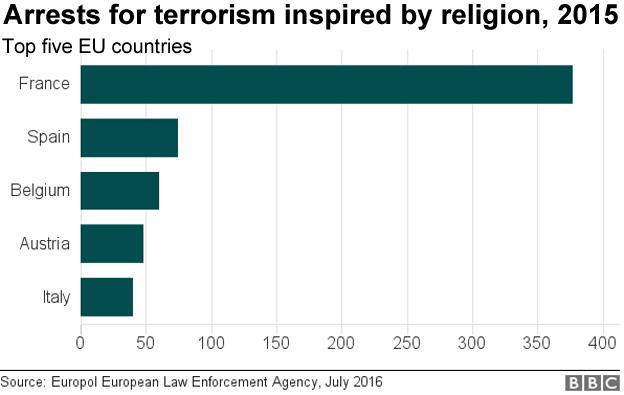
France is still in a state of emergency following a number of terror attacks, including 14 July last year when 86 people died as a lorry ploughed into a crowd in Nice celebrating Bastille Day.
More than 230 people have died in terror attacks in France since January 2015.
Hundreds of young French Muslims are known to have travelled to Iraq and Syria, external to fight for so-called Islamic State. Interior ministry figures say almost 700 French citizens are still in the region - although numbers have dropped off, external in the past year.
Some of the perpetrators of the Paris attacks in November 2015 are known to have travelled to Syria - French officials fear others who have been radicalised may now return to France to commit further atrocities.

Immigration
Tens of thousands of migrants have arrived in France as a result of the crisis which began in 2015, largely as a result of people fleeing the conflicts in Syria and Iraq.
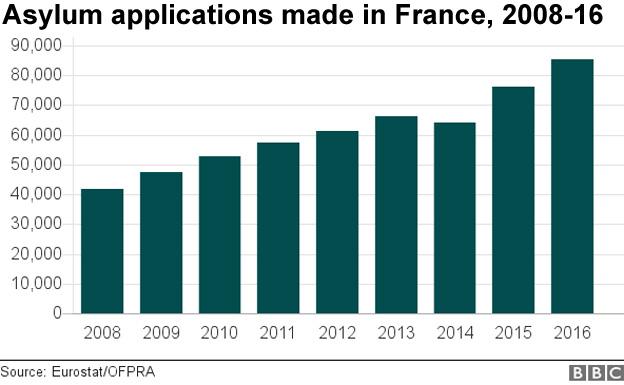
France received more than 85,000 applications for asylum, external in 2016 - more than 5,800 came from Syria. Although the figure has been rising steadily, the number of asylum-seekers applying to stay in France is lower than other European countries like Germany.
Official figures from 2014 show 8.9% of the 65.8m French population, external were immigrants. The figure has risen by 0.8% since 2006.
There is no official breakdown of the figures, as it is illegal in France to collect data on race and religion, but there are thought to be about five million Muslims living in France, the biggest Muslim population, external in the EU.
The majority of France's Muslim population live in the poorer suburbs of big cities like Paris, Marseille and Lyon, where unemployment, external is much higher than the national average.
The National Front has made treatment of immigrants one of its key policy issues - saying jobs, welfare, housing and school places should go to French nationals before "foreigners". A Pew Research Center, external survey in 2016 indicated that 29% of French adults viewed Muslims unfavourably.